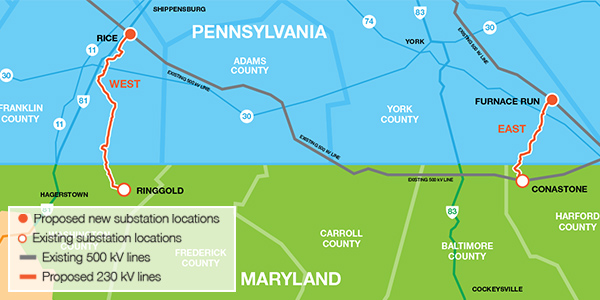By Rich Heidorn Jr.
The Maryland Public Service Commission extended the schedule for its review of Transource Energy’s controversial Independence Energy Connection for 30 days to allow parties to provide additional evidence on proposed alternatives.
The PSC rejected a motion by the Power Plant Research Program (PPRP) of the Maryland Department of Natural Resources to dismiss Transource’s application for a certificate of public convenience and necessity (CPCN) or suspend the schedule.
But the commission’s Jan. 15 ruling set a new deadline of Feb. 25 for the PPRP, PSC staff, the Office of People’s Counsel (OPC) and local residents opposing the line to file direct testimony (Case #9471).
PSC staff and OPC supported PPRP’s argument that the PSC should reject the project because Transource failed to examine alternative solutions as required by state law. Staff recommended the commission grant the motion, suspend the procedural schedule and direct Transource to supplement its application.
The $372 million project would add two 230-kV double-circuit lines, totaling about 42 miles across the Maryland-Pennsylvania border.
The PPRP said Transource had failed to meet requirements to examine alternatives if an existing transmission line “is convenient to the service area; or the use of the transmission line will best promote economic and efficient service to the public.”
The agency said the need for the eastern segment of the project could be met by the existing Furnace Run-Conastone and Furnace Run-Graceton 230-kV double-circuit transmission tower lines, each of which has only one 230-kV circuit and could carry a second. (See Cancel Transource Line, Md. Panel Says.)
Transource responded it was not required to study PPRP’s proposed alternative and said it met the requirements of state law by analyzing “over 30 study segments.”
“Disputes over whether the commission should consider an alternative are properly the subject of competing testimony at the evidentiary hearing,” Transource said.
The commission said it was modifying the procedural schedule to allow the parties to conduct additional analysis or discovery regarding the use of PPRP’s alternative.
“In response to PPRP’s motion, Transource acknowledges that as the CPCN applicant — the party with the burden of proof — it should be prepared to present evidence at the hearing to address any suggestions by other parties that the proposed project should be denied because there exists a clearly superior alternative,” the commission said. “This criteria includes the existing transmission line evaluation requirements set forth in [section 7-209 of the Public Utilities Article, Maryland Annotated Code].”
Rebuttal testimony will be due by March 18, with surrebuttal testimony and any PPRP response to public comments due April 1. The commission said it will allow live rejoinder testimony if needed during the evidentiary hearings.
Mary Urban, community affairs representative for Transource, issued a statement reiterating it has met all filing requirements under Maryland law.
“Transource has presented a substantial amount of information regarding alternatives,” Urban added. “As the case proceeds, the company will respond as is appropriate under commission rules.”
PJM said in November the project would reduce load costs by $707.3 million in net present value over 15 years, producing a benefit-cost ratio of 1.4. PJM declined to comment Tuesday.
Assistant Attorney General Sondra Simpson McLemore, who filed the motion to dismiss for PPRP, did not immediately respond to a request for comment.





